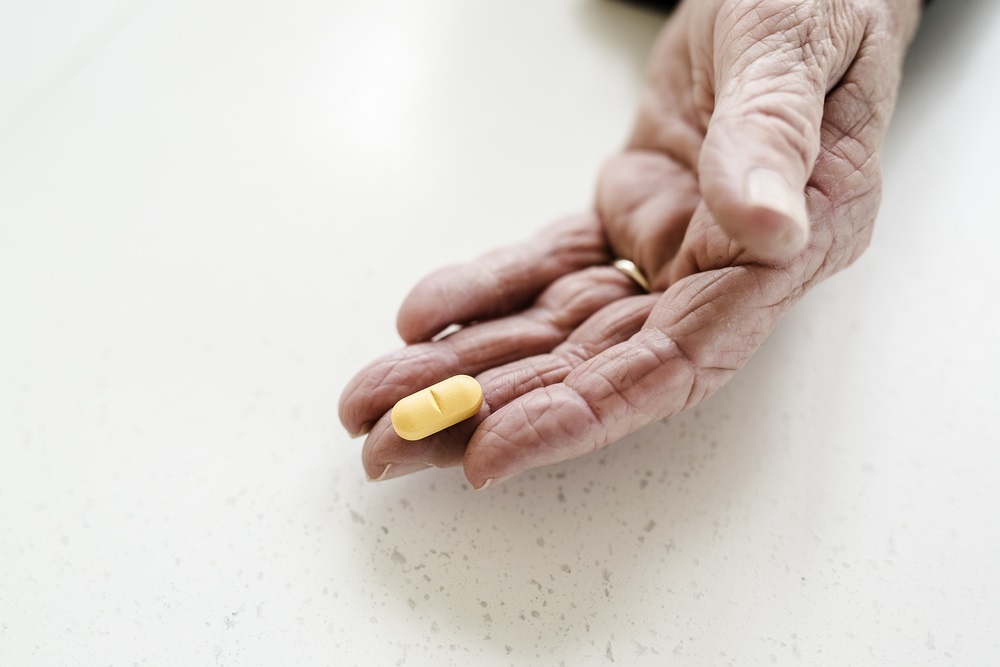
Drug used to treat Parkinson’s shows potential as a dementia treatment
A drug currently used to treat patients with Parkinson's who suffer from hallucinations and delusions has shown promise as a potential treatment for dementia-related psychosis (DRP).
 Image Credit: Lopolo / Shutterstock.com
Image Credit: Lopolo / Shutterstock.comAccording to a study presented yesterday at the Clinical Trials on Alzheimer's Disease meeting in San Diego, the antipsychotic drug pimavanserin was shown to significantly reduce the risk of psychotic relapse among patients with DRP.
In a double-blind, placebo-controlled, relapse prevention trial, pimavanserin met the primary endpoint of the study by significantly reducing the risk of DRP relapse by almost three-fold, compared with placebo.
If the drug is approved by the Food and Drug Administration (FDA), it would be the first therapy ever to be FDA- approved for DRP.
Pimavanserin is a selective serotonin inverse agonist and antagonist that targets receptors that are thought to play a key role in psychosis, schizophrenia, depression, and other neuropsychiatric disorders.
The HARMONY study
In a clinical trial called the HARMONY study, 392 patients (average age 74.5 years) with moderate-to-severe DRP were treated with pimavanserin 34 mg once daily over a 12-week open-label stabilization period. Based on patient tolerability during the first four weeks, dose reduction to 20mg once daily was allowed. Following this open-label period, patients who met treatment response criteria were randomized to either continue the 34mg or 20mg daily dose of pimavanserin or to receive a placebo for up to 26 weeks or until a relapse of DRP occurred.
The researchers report that during the 12-week open-label period, pimavanserin significantly reduced symptoms and stabilized psychosis across all subtypes evaluated.
During the 26-week double-blind period, patients taking pimavanserin had a 2.8-fold reduction in relapse risk, compared with patients who received a placebo. Furthermore, pimavanserin was also well-tolerated by participants.
The drug manufacturer says it will seek FDA approval in 2020
The company that makes the drug has said that it will seek FDA approval of the drug as a treatment for DRP in 2020.
According to the company, approximately 8 million people in the United States are living with dementia and studies suggest that about 30% of them (2.4 million) have psychosis, commonly consisting of delusions and hallucinations: "Serious consequences have been associated with severe or persistent psychosis in patients with dementia such as repeated hospital admissions, increased likelihood of nursing home placement, progression of dementia, and increased risk of morbidity and mortality."
According to the Alzheimer's Association, the average cost of catering for the health needs of an Alzheimer's patient during the time between diagnosis and death is $341,000, and seventy percent of that is paid for by the family.
The overall cost of care for Alzheimer's patients is projected to increase to $1.1 trillion by 2050, and the number of people diagnosed is expected to climb from 53 million in 2018 to 88 million in 2050.
The FDA has granted "Breakthrough Therapy" designation for pimavanserin
The FDA has granted "Breakthrough Therapy" designation for pimavanserin as a treatment for DRP treatment. according to the FDA, this designation "is a process designed to expedite the development and review of drugs that are intended to treat a serious condition and preliminary clinical evidence indicates that the drug may demonstrate substantial improvement over available therapy on a clinically significant endpoint(s)."
Jeffrey Cummings, director emeritus of Cleveland Clinic Lou Ruvo Center for Brain Health in Las Vegas, says the findings presented at the San Diego meeting represent an important advance for patients and caregivers who struggle with the burden of DRP, where no FDA-approved treatment is currently available.
Source:



































No hay comentarios:
Publicar un comentario